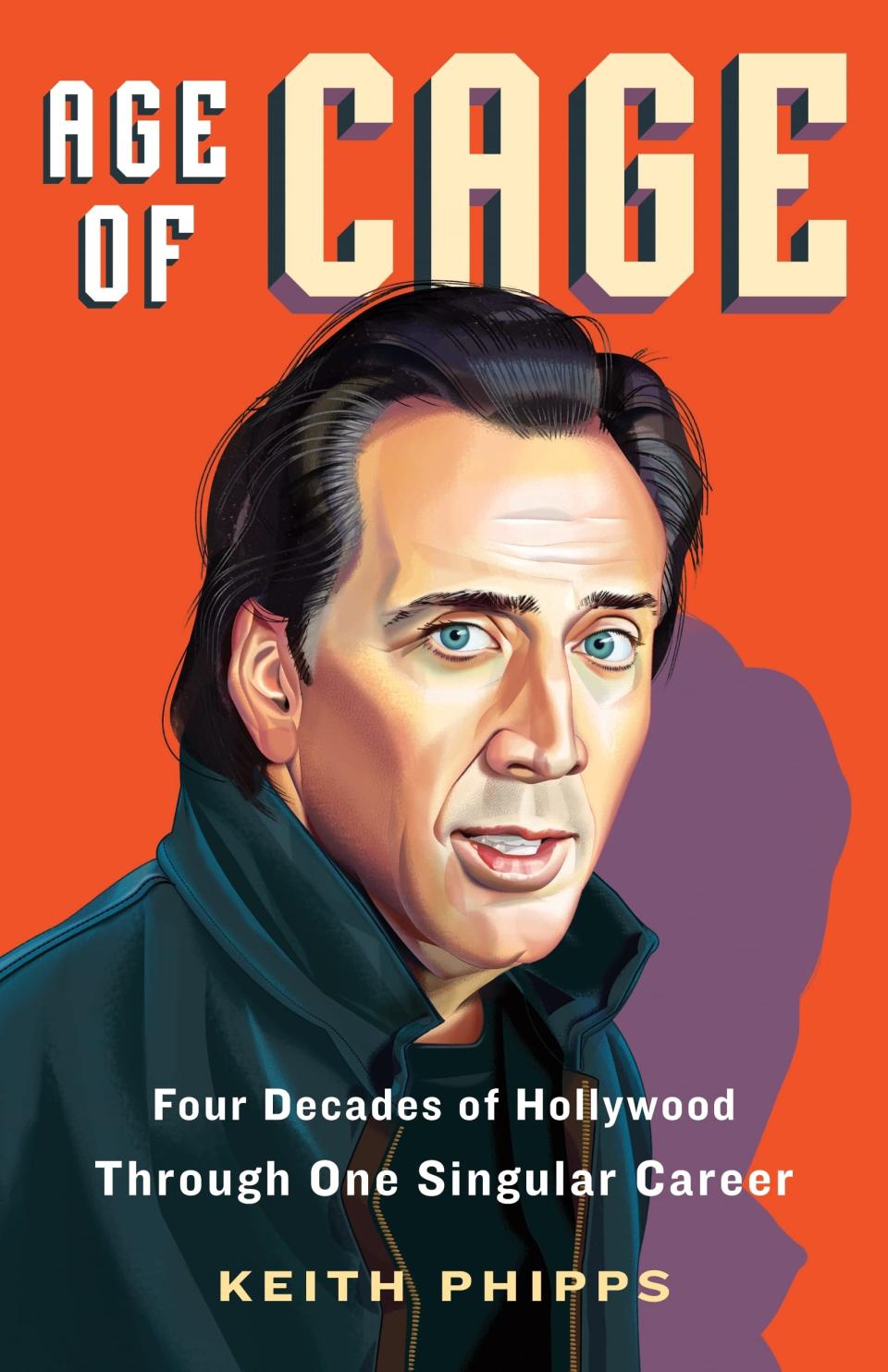How a new film and book dive deep into Nicolas Cage — the man, myth and legend

- Oops!Something went wrong.Please try again later.
Nicolas Cage is no joke.
Sure, the last 10 years have seen the Oscar-winning, blockbuster-making actor go straight to video-on-demand more often than not.
The press treated his financial woes as a punchline — sort of hard not to when your struggles result from buying multiple castles, countless sports cars and a dinosaur skull. Or take Cage’s brief marriage to Lisa Marie Presley, which seemed to fit into a weird obsession with the King himself. Or any of the multiple marriages that didn't last long. The list could go on.
These extravagantly absurd details create a strangeness around the actor that betrays his mastery of the craft. Or maybe that strangeness enhances the mastery, making Cage a unique character in his own right.
So much so that his new film, “The Unbearable Weight of Massive Talent,” features Cage playing Nicolas Cage as a movie star in an existential crisis. He takes a job because he needs the money and the Nicolas Cage character finds himself in a scenario that looks very much like a cheap-o Nicolas Cage action flick from the past 10 years.
Cage may be no joke, but his life does make for a pretty funny story.
More: How Robert Eggers' 'The Northman' spins an unlikely revenge story
A story worth examining, as film critic Keith Phipps does in the just-released “Age of Cage.” The book, a breezy and well-researched bit of analysis, not only seeks to understand Cage’s career but also how Hollywood changed over that same period. A time that saw the dawn of big-budget spectacle which would eventually wipe out the concept of “movie stars” in favor of well-worn characters and concepts.
While the marquee actor type may be dying, Cage keeps going and Phipps does a nice job offering his thoughts on why that is.
“The Age of Cage” isn’t necessary to understanding the meta-satire of “Unbearable Weight.” Some crucial points includes the actor’s deep love for silent movies, which also explains the physicality Cage bring to his performances. Or his disdain for the Stanislavski method, which also helps one understand the unbound, fantastical nature of Cage’s approach.
But the critical observation of both Phipps and the “Unbearable Weight” filmmakers centers around the theme of duality, manifesting itself more obviously in “Face/Off,” the high-concept action flick where Cage and John Travolta switch faces and personas.
Or “Adaptation,” where Cage earned an Oscar nomination for playing both real-life screenwriter Charlie Kaufman as well as his fictional twin brother as they struggle to turn an “unadaptable” book into a film.
In “Unbearable Weight,” Cage is visited by a vision of his younger self — referred to as “Nicky” — and played by the actor with very smooth de-aging technology. Nicky taunts the actor for the decisions he’s made.
It’s not accurate to say Nicolas and “Nicky” exist as separate compartments of Cage’s oeuvre, but rather lie in uneasy co-existence. While audiences flocked to see him in Bruckheimer blockbusters like “The Rock” and “National Treasure,” Cage was also making very “Nicky” movies about snuff films (“8mm”) and unsavory arms dealers (“Lord of War”).
More: These summer music festivals are a day's drive or less from Columbia
In fact, Cage floated the idea of creating an alter ego — Miles Lovecraft, blending the names of the jazz musician and fantasy writer — that would be a moniker used for “darker, edgier fare.” His agents talked him out of it, but “Unbearable Weight” makes reference to this when Nicky implores Nicolas to listen to Miles Davis songs for career advice.
“He was also a heroin addict,” Nicolas retorts.

Duality is part of the Cage package. There’s the talented actor who pushes himself to unusual limits to service his art. But there’s the enormous material appetite that finds the need to work non-stop, and to take whatever paycheck he can, to keep the creditors at bay. Even as his choices in roles appear desperate, the work is still substantial.
“I am delivering A-list performances in B-list presentations,” Cage once told filmmaker Paul Schrader. The two Nicolas Cages demand him to do so.
This idea is embodied in last year’s “Pig,” where he plays a reclusive chef whose cherished truffle pig is kidnapped. He emerges from the woods back to the Portland restaurant scene to find the titular creature. The premise invites a chuckle — it reads as “Taken” with swine — but Cage infuses the film with earnest heartbreak.
Notable is a moment where he dresses down a former employee (“I fired you because you overcooked the noodles”) for opening a trendy restaurant rather than sticking with his dream of creating an authentic English pub. The moment is effective not simply as a great piece of drama, but also for the real-life layers created by Cage.
The character is an artist who critiques this lesser mortal, not because of the work he’s chosen but because he failed to be true to himself. This scene captures something essential about Cage; about staying true to one’s artistic drive no matter what circumstances require you to do.
More: Columbia's Steph Foley walks the line between hope, heartache on new Vulvette EP
To that end, I wouldn’t call “Unbearable Weight” essential to understanding the actor. It’s fun, but the third act drops the satire and becomes a straightforward action film that’s no more compelling than the terrible films it attempts to emulate. It is the same structure as “Adaptation" — but that film knew how to make its overblown climax part of the film’s cleverness.
Phipps’ book does remind me of films little seen by many that still pack a punch. In addition to “Pig,” the one-two punch of “The Weather Man” and “Lord of War” — released within a month of each other in 2005 — are both four-star films that show incredible range.
Or the great neo-noir Western “Red Rock West.” It’s even come to my attention there are lots of people who’ve never seen “Raising Arizona,” which is my personal favorite film. Watching those movies should be necessary homework this weekend.
Some might say, with this book and new film, that we’re seeing a needed re-evaluation of Nicolas Cage. I say we never should have had any doubts. But any opportunity to stop and appreciate the dynamic career of this one-of-a-kind talent should be seized upon.
In real life, James Owen is a lawyer and executive director of energy policy group Renew Missouri. He created/wrote for Filmsnobs.com from 2001-2007 before an extended stint as an on-air film critic for KY3, the NBC affiliate in Springfield. He was named a Top 20 Artist under the Age of 30 by The Kansas City Star when he was much younger than he is now.
This article originally appeared on Columbia Daily Tribune: A new film and book dive deep into Nicolas Cage — man, myth and legend

